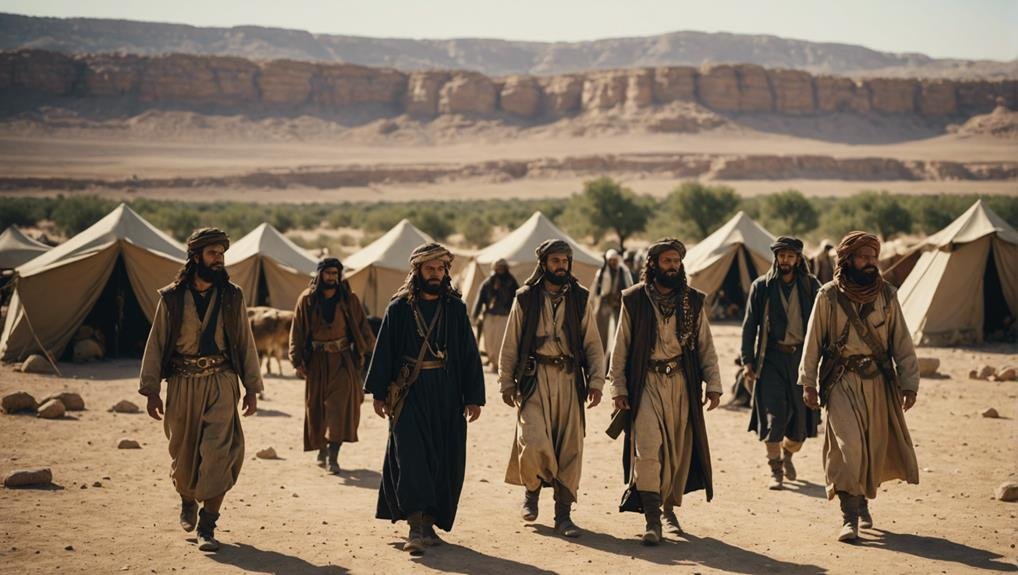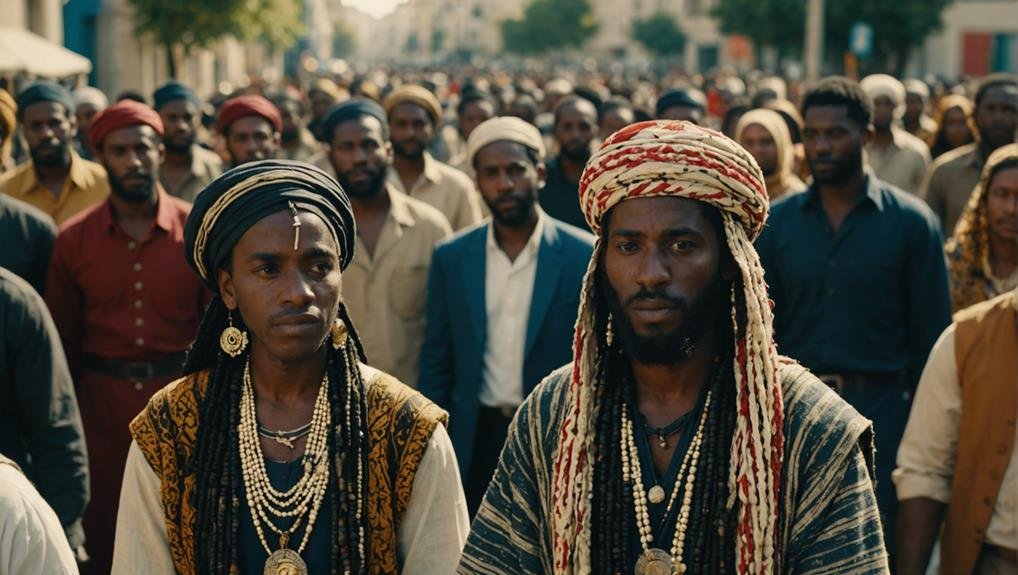So, who exactly are the Israelites? Well, imagine a lineage steeped in history and tradition, a people whose roots run deep into the fabric of ancient times. Their story is one of resilience, faith, and unwavering determination.
But what truly defines the essence of being an Israelite? Stay tuned as we unravel the layers of this intricate tapestry that spans centuries and continents, delving into the heart of a community shaped by a shared past and a vision for the future.
Key Takeaways
- Descendants of the twelve tribes of Israel, originating from Jacob’s sons.
- Played a crucial role in ancient Israelite society, with distinct characteristics and territories.
- Hebrew people have a deep connection to the land of Israel, which symbolizes their ancestral homeland.
- Shared monotheistic beliefs, distinguishing them from neighboring polytheistic cultures.
- Israelites and Jewish people share a significant historical and cultural connection.
Ancient Israelite Origins

The Israelites’ origins trace back to the Hebrew patriarch Jacob, later known as Israel, after a significant encounter near the stream of Jabbok. Jacob, also called Israel, had twelve sons who became the ancestors of the Twelve Tribes of Israel.
These tribes formed a significant part of ancient Israelite society and were instrumental in shaping the Israelite people’s identity. Jacob’s twelve sons formed a distinct tribe with its characteristics and territories.
These tribes played a pivotal role in the history and development of the Israelites, both before and after the division of the kingdom in 930 BCE. The division led to establishing the northern kingdom of Israel, separate from the southern kingdom of Judah.
Understanding the lineage and heritage of the Israelites through the twelve sons of Jacob provides valuable insights into the complexity and richness of ancient Israelite origins.
Biblical Israelite Tribes
Originating from the twelve sons of Jacob, the Biblical Israelite tribes were distinct entities with unique territories and roles within the community. As outlined in Old Scripture, each of the twelve tribes held a specific portion of land in the Promised Land.
The tribes of Israel, including Judah, Benjamin, Reuben, and others, weren’t only geographical divisions but also social and political units that contributed to the cohesion of the Israelite people.
The division into tribes wasn’t merely administrative but also held religious significance, with each tribe having responsibilities and duties in religious ceremonies and governance.
This tribal structure significantly shaped the ancient Israelites’ societal dynamics, religious practices, and overall identity. Despite their characteristics and roles, the Israelite tribes maintained a sense of unity and common heritage, forming a collective identity throughout their history.
Israelite Exodus From Egypt

Recalling a pivotal moment in biblical history, the Israelite Exodus from Egypt signifies the liberation of a people from oppressive bondage. According to the Book of Exodus, Moses led the Israelites out of Egypt following the Ten Plagues and the miraculous parting of the Red Sea.
This event holds significant importance in Jewish tradition, with the Exodus commemorated annually during Passover as a symbol of deliverance and freedom. Despite its religious significance, scholars debate the historicity of the Exodus story, examining archaeological findings and textual evidence to understand its validity.
The Israelite Exodus from Egypt stands as a foundational event that profoundly influenced the identity and faith of the Jewish people, shaping their beliefs and cultural practices for generations to come. The narrative of the Exodus continues to resonate as a powerful symbol of hope and liberation, inspiring individuals to seek freedom from oppression and tyranny.
Kingdom of Israel
Establishing itself in the northern part of ancient Palestine following the division of the Hebrew kingdom, the Kingdom of Israel comprised ten tribes distinct from the southern Kingdom of Judah. This kingdom played a significant role in the Israelites’ history, shaping the region’s political and cultural landscape.
Unfortunately, the Kingdom of Israel fell when it was conquered by the Assyrians around 722/721 BCE. This event led to the dispersal and assimilation of the Israelite population, marking a significant turning point in their history. The fall of the Kingdom of Israel was a pivotal moment that reverberated throughout the ancient world.
Despite its ultimate demise, the Kingdom of Israel’s legacy continued to influence subsequent developments in the region. The story of the Kingdom of Israel serves as a reminder of the complex and tumultuous history of the Israelites in Palestine.
Israelite Diaspora

The Israelite diaspora saw the scattering of Israelites beyond their traditional homeland following the Assyrian and Babylonian invasions. These events led to the formation of Lost Tribes, dispersed across regions like Egypt, Mesopotamia, and Persia.
Despite the upheaval, diaspora communities played an important role in preserving and spreading Israelite culture and identity. Samaritans, considered part of the Israelite diaspora, maintained distinct religious and cultural practices.
Their existence highlights the diversity within the dispersed Israelite communities. These groups often faced challenges in maintaining their traditions while adapting to new environments.
The Israelite diaspora serves as a tribute to the resilience of the Israelite people, showing their ability to endure and adapt in the face of adversity. Through their dispersion, the Lost Tribes carried on the legacy of their ancestors, contributing to the rich tapestry of Jewish history and heritage.
Genetic Heritage of Israelites
Limited studies on ancient Israelite genetic material have hindered thorough analysis of their genetic heritage. Genetic research has provided valuable insights into the Kingdom of Israel’s genetic heritage despite this limitation.
Studies have shown a shared Middle Eastern ancestry among diasporic Jewish populations, indicating a common genetic thread. Additionally, genetic proximity has been observed between Jewish groups and Arab populations, suggesting historical interactions and shared ancestry.
Of particular interest is the genetic composition comparisons that have revealed common ancestry between Samaritans and Jewish communities. These findings shed light on the historical relationships and genetic connections within the Israelite Kingdom.
Historical Israelite Contributions

Exploring ancient Israelite contributions provides insight into their cultural and societal impact in the ancient Near East. One significant aspect is the Kingdom of Judah, which emerged around the 10th century BCE. The Israelites, particularly those from Judah, made notable contributions in various fields.
They excelled in craftsmanship, as seen in the intricate designs of the First Temple in Jerusalem. The Kingdom of Judah also played a role in shaping religious practices, with the development of early forms of monotheism centered on Yahweh.
Additionally, Israelite society showed advancements in agriculture, urban planning, and governance, establishing a foundation for future civilizations. The Israelites’ use of Biblical Hebrew as a written language further contributed to the preservation of their history and traditions.
These historical contributions by the Israelites, especially those hailing from the Kingdom of Judah, continue to influence modern understanding of ancient Near Eastern cultures.
Modern Israelite Identity
Delving into the contemporary notion of Israelite identity offers a glimpse into the enduring connections modern individuals maintain with their ancient Hebrew roots.
Modern Israelites, primarily descendants of the biblical tribes of Israel, carry a rich heritage that shapes their sense of self and community today. Here are three key aspects highlighting the modern Israelite identity:
- Lineage and Ancestry: Many modern Israelites proudly trace their lineage back to the twelve tribes of Israel, cherishing the historical connection and cultural significance that comes with being part of this ancient lineage.
- Cultural Continuity: The traditions, customs, and religious practices observed by modern Israelites reflect a desire to preserve the legacy of the ancient Hebrew tribes. These cultural elements bridge the past and the present, fostering a sense of identity and belonging.
- Connection to the Land: For modern Israelites, the land of Israel holds a special place in their hearts. It symbolizes not only a physical homeland but also a spiritual link to their ancestors and heritage. This deep connection to the land further solidifies their identity as descendants of the twelve tribes of Israel.
Israelites and Jewish People

Israelites and Jewish people share a significant historical and cultural connection stemming from their common roots in the ancient Hebrew tribes. In the Old Covenant, the terms ‘Israelite,’ ‘Hebrew,’ and ‘Jew’ are often used interchangeably to refer to God’s chosen people.
Descendants of the Hebrew patriarch Jacob, these groups are considered part of the Twelve Tribes of Israel. Following the division of the kingdoms, the northern kingdom of Israel fell to the Assyrians in 722/721 BCE, resulting in the absorption of its people by other groups.
Within synagogue practices, the term ‘Israelites‘ typically denotes Jews who aren’t cohanim (descendants of Aaron) or Levites. The fall of the kingdom of Israel marked a pivotal event in the history and identity of the Israelite people, emphasizing their shared heritage and divine calling as God’s chosen people.
Israelite Cultural Influence
With roots deeply intertwined in ancient Hebrew traditions, the cultural influence of the Israelites remains a cornerstone of historical study and societal impact. The Israelites’ legacy continues to shape the region and beyond, influencing various aspects of contemporary societies.
Here are three key points highlighting the Israelite cultural influence:
- The Twelve Tribes of Israel: These tribes played an essential role in forming the social structure and identity of the Israelites. Each tribe had customs, territories, and responsibilities that contributed to the richness of Israelite culture.
- Monotheistic Beliefs: Central to Israelite culture were their monotheistic beliefs in one God. This fundamental aspect not only guided their religious practices but also distinguished them from neighboring polytheistic societies.
- Tribal Governance: The Israelites’ tribal structure influenced their governance systems, interactions with neighboring nations, and religious rituals. This unique governance model was a significant part of their cultural heritage, shaping societal norms and practices.
Conclusion
To sum up, the Israelites are a significant ancient tribe with a rich history and cultural heritage. Their origins can be traced back to the biblical figure Jacob, known as Israel, and they played a key role in the formation of the Kingdom of Israel.
Despite facing challenges such as the diaspora, the Israelites have maintained a strong sense of identity and continue to make important contributions to society. Their legacy lives on in the modern world through their influence on Jewish culture and traditions.

